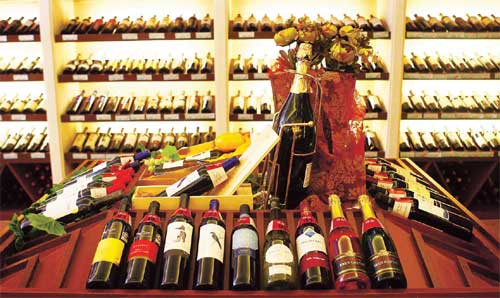
 |
|
Beijing's selection of imported and domestic wines continues to grow, with a dramatic range of prices available. [PHOTOS PROVIDED BY 99 PLUS, SOLANA] |
METRO set out to pull the cork on why a glass of the grape is so costly
With growing numbers of Beijingers consuming the delectable nectar known locally as "grape wine", domestic products are also soaking up the benefits of a flourishing industry.
However, while the money does seem to be flowing, the domestic public's ability to distinguish a good wine continues to go through a dry spell.
"Domestic wines make up 80 percent of the market," said Matthew Bahen, managing director of the Wine Republic distributor in Beijing.
"However, the reality is that there is an impression that imported products are better."
Bahen said Chinese wines often lack the prominence and the brand name recognition of their international counterparts. The problem doesn't lie with the quality of the wine though, but with the way Chinese society values grape wines.
Professor Ma Huiqin, of China Agricultural University in Beijing, believes the average consumer is influenced by the advertisements of the bigger Chinese brands such as Changyu Pioneer, Great Wall and the Dynasty Wines.
"The inexperienced consumer has to rely on the adverts they see to decide which brand to buy," Ma said.
"Ultimately though, the main Chinese shopping point is price - they equate cost to quality."
While the exact relationship is certainly more complex, the local mindset remains simple on the subject at hand - grape wines are a symbol of class and elegance.
Ma said putting the bottle on a pedestal creates a false value, inflating the price of many domestic wines. This inflation then creates a paradox in which expensive domestic wines are only comparable to mid-range imports.
One of the most obvious examples for this price hike is at a restaurant. While it's common for people to order a bottle of wine with a meal in New York and Paris, the same rule does not apply in Beijing.
Instead, Beijing diners are often more likely to order hard liquor, like Erguotou, because it is cheaper. Wine with meals in the West is affordable - the cost of a bottle often matches a dinner entre - but the same bottle in Beijing could equate to the whole meal.
"The high prices of wine make it so that many Chinese do not want to drink wine," said Ma.
"Wine is too expensive for the public to experiment with, so many Chinese don't know the subtleties of different bottles."
Distinct flavors, from fruity sweetness to complex sourness, seem lost onto the average consumer. As a result, without the proper knowledge, consumers are now paying through the nose for wines of standard quality.
To curb this trend, Jim Boyce, a local Beijing food and drink connoisseur and critic, along with a bevy of top wine "experts", have created a project to give a voice to Beijing's wine fans.
Entitled "The Grape Wall of China", the group seeks to provide a venue where locals can meet with winemakers and experts to learn about types in every price range.
"There is a lot of fear around wine. No one is afraid to say which burger they like or which pizza they prefer, but they are afraid to name a wine," Boyce said.
"We want to eliminate that fear so that when they order wine at a restaurant, they can select the type they really like."
China Daily
(China Daily 08/26/2010 page28)